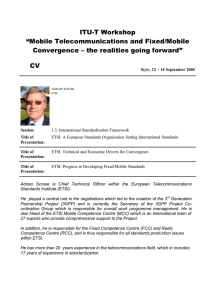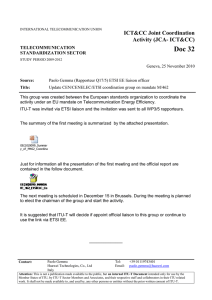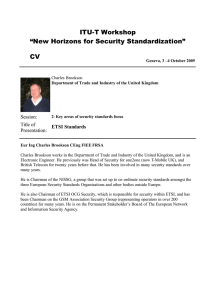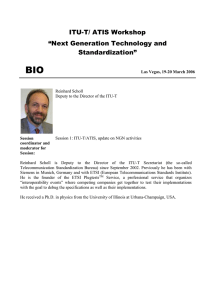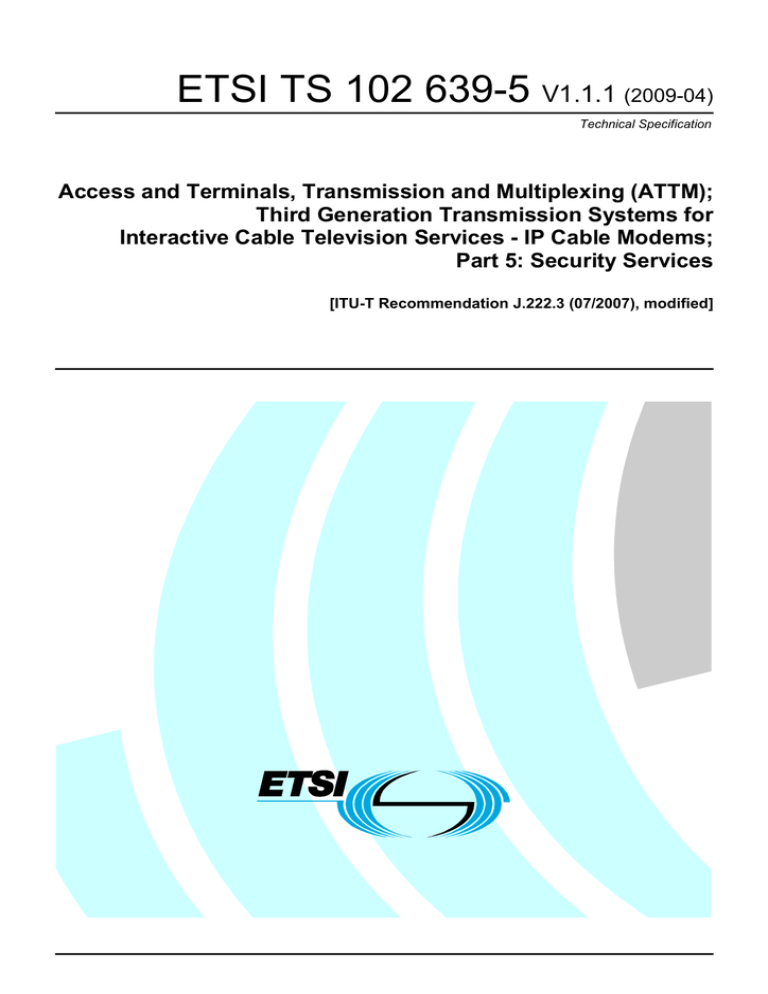
ETSI TS 102 639-5 V1.1.1 (2009-04)
Technical Specification
Access and Terminals, Transmission and Multiplexing (ATTM);
Third Generation Transmission Systems for
Interactive Cable Television Services - IP Cable Modems;
Part 5: Security Services
[ITU-T Recommendation J.222.3 (07/2007), modified]
2
ETSI TS 102 639-5 V1.1.1 (2009-04)
Reference
DTS/ATTM-02006-5
Keywords
aceess, broadband, cable, endorsement, MAC,
modem
ETSI
650 Route des Lucioles
F-06921 Sophia Antipolis Cedex - FRANCE
Tel.: +33 4 92 94 42 00 Fax: +33 4 93 65 47 16
Siret N° 348 623 562 00017 - NAF 742 C
Association à but non lucratif enregistrée à la
Sous-Préfecture de Grasse (06) N° 7803/88
Important notice
Individual copies of the present document can be downloaded from:
http://www.etsi.org
The present document may be made available in more than one electronic version or in print. In any case of existing or
perceived difference in contents between such versions, the reference version is the Portable Document Format (PDF).
In case of dispute, the reference shall be the printing on ETSI printers of the PDF version kept on a specific network drive
within ETSI Secretariat.
Users of the present document should be aware that the document may be subject to revision or change of status.
Information on the current status of this and other ETSI documents is available at
http://portal.etsi.org/tb/status/status.asp
If you find errors in the present document, please send your comment to one of the following services:
http://portal.etsi.org/chaircor/ETSI_support.asp
Copyright Notification
No part may be reproduced except as authorized by written permission.
The copyright and the foregoing restriction extend to reproduction in all media.
© European Telecommunications Standards Institute 2009.
All rights reserved.
TM
TM
TM
TM
DECT , PLUGTESTS , UMTS , TIPHON , the TIPHON logo and the ETSI logo are Trade Marks of ETSI registered
for the benefit of its Members.
TM
3GPP is a Trade Mark of ETSI registered for the benefit of its Members and of the 3GPP Organizational Partners.
LTE™ is a Trade Mark of ETSI currently being registered
for the benefit of its Members and of the 3GPP Organizational Partners.
GSM® and the GSM logo are Trade Marks registered and owned by the GSM Association.
ETSI
3
ETSI TS 102 639-5 V1.1.1 (2009-04)
Contents
Intellectual Property Rights ................................................................................................................................4
Foreword.............................................................................................................................................................4
Introduction ........................................................................................................................................................4
1
Scope ........................................................................................................................................................5
2
References ................................................................................................................................................5
2.1
2.2
3
3.1
3.2
Normative references ......................................................................................................................................... 5
Informative references ........................................................................................................................................ 5
Definitions and abbreviations ...................................................................................................................6
Definitions .......................................................................................................................................................... 6
Abbreviations ..................................................................................................................................................... 6
Endorsement notice ............................................................................................................................................7
Modifications to ITU-T Recommendation J.222.3 ............................................................................................................. 7
Annex A (informative):
Bibliography .....................................................................................................8
History ..............................................................................................................................................................10
ETSI
4
ETSI TS 102 639-5 V1.1.1 (2009-04)
Intellectual Property Rights
IPRs essential or potentially essential to the present document may have been declared to ETSI. The information
pertaining to these essential IPRs, if any, is publicly available for ETSI members and non-members, and can be found
in ETSI SR 000 314: "Intellectual Property Rights (IPRs); Essential, or potentially Essential, IPRs notified to ETSI in
respect of ETSI standards", which is available from the ETSI Secretariat. Latest updates are available on the ETSI Web
server (http://webapp.etsi.org/IPR/home.asp).
Pursuant to the ETSI IPR Policy, no investigation, including IPR searches, has been carried out by ETSI. No guarantee
can be given as to the existence of other IPRs not referenced in ETSI SR 000 314 (or the updates on the ETSI Web
server) which are, or may be, or may become, essential to the present document.
Foreword
This Technical Specification (TS) has been produced by ETSI Technical Committee Access, Terminals, Transmission
and Multiplexing (ATTM).
The present document is part 5 of a multi-part deliverable covering Third Generation Transmission Systems for
Interactive Cable Television Services - IP Cable modems. Full details of the entire series can be found in part 1 [i.1].
Introduction
This European Standard (Cable DOCSIS 3.0 Network series) has been produced by ETSI Access, Terminals,
Transmission and Multiplexing Technical Committee (ATTM), Cable Access Network sub-group.
ETSI
5
1
ETSI TS 102 639-5 V1.1.1 (2009-04)
Scope
The present document defines the security requirements as part of a series of specifications for the third generation of
high-speed Data-Over-Cable Systems Interface Specifications (DOCSIS®).
They were developed for the benefit of the cable industry, including contributions by operators and vendors from,
Europe, North America and other regions.
The source material for this specification was provided by the ITU-T Recommendation J.222.3 [3] for which the most
recent version can be found at http://www.itu.int/ITU-T/.
2
References
References are either specific (identified by date of publication and/or edition number or version number) or
non-specific.
•
For a specific reference, subsequent revisions do not apply.
•
Non-specific reference may be made only to a complete document or a part thereof and only in the following
cases:
-
if it is accepted that it will be possible to use all future changes of the referenced document for the
purposes of the referring document;
-
for informative references.
Referenced documents which are not found to be publicly available in the expected location might be found at
http://docbox.etsi.org/Reference.
NOTE:
2.1
While any hyperlinks included in this clause were valid at the time of publication ETSI cannot guarantee
their long term validity.
Normative references
The following referenced documents are indispensable for the application of the present document. For dated
references, only the edition cited applies. For non-specific references, the latest edition of the referenced document
(including any amendments) applies.
[1]
ETSI TS 102 639-4: "Access and Terminals, Transmission and Multiplexing (ATTM); Third
Generation Transmission Systems for Interactive Cable Television Services - IP Cable Modems;
Part 4: MAC and Upper Layer Protocols ITU-T Recommendation J.222.2 (07/2007), modified]".
[2]
ETSI TS 101 909-11 "Digital Broadband Cable Access to the Public Telecommunications
Network; IP Multimedia Time Critical Services; Part 11: Security".
[3]
ITU-T Recommendation J.222.3" Third-generation transmission systems for interactive cable
television services - IP cable modems: Security services".
2.2
Informative references
The following referenced documents are not essential to the use of the present document but they assist the user with
regard to a particular subject area. For non-specific references, the latest version of the referenced document (including
any amendments) applies.
[i.2]
ETSI TS 102 639-3: "Access and Terminals, Transmission and Multiplexing (ATTM); Third
Generation Transmission Systems for Interactive Cable Television Services - IP Cable Modems;
Part 3: Downstream Interface [ITU-T Recommendation J.210 (11/2006), modified]".
ETSI
6
ETSI TS 102 639-5 V1.1.1 (2009-04)
[i.3]
ETSI TS 102 639-1: "Access and Terminals, Transmission and Multiplexing (ATTM); Third
Generation Transmission Systems for Interactive Cable Television Services - IP Cable Modems;
Part 1: General".
[i.4]
ETSI ES 201 488: "Access and Terminals (AT); Data Over Cable Systems; Part 1: General".
[i.5]
ITU-T Recommendation J.222.1: "Third-generation transmission systems for interactive cable
television services - IP cable modems: Physical layer specification".
[i.6]
ITU-T Recommendation J.210: "Downstream RF Interface for Cable Modem Termination
Systems".
[i.7]
ITU-T Recommendation J.222.2: "MAC and Upper Layer protocols for third-generation
transmission systems for interactive cable television services - IP cable modems".
[i.8]
ITU-T Recommendation J.112: "Transmission systems for interactive cable television services".
[i.9]
ITU-T Recommendation J.170: "IPCablecom security specification".
[i.10]
ITU-T Recommendation X.690: "Information technology - ASN.1 encoding rules: Specification of
Basic Encoding Rules (BER), Canonical Encoding Rules (CER) and Distinguished Encoding
Rules (DER)".
3
Definitions and abbreviations
3.1
Definitions
For the purposes of the present document, the following terms and definitions apply:
DER Encoded: Refers to a value which is encoded using the ASN.1 Distinguished Encoding Rules (see ITU-T
Recommendation X.690 [i.11]).
downstream: flow of signals from the cable system control center through the distribution network to the customer
NOTE:
For communication purposes, associated with transmission (down) to the end-user.
dynamically-joined multicast sessions: multicast sessions joined after cable modem registration
key transition period: time period in which an Authentication Key that is near its expiration is replaced by a new
Authentication Key through a negotiated update process between the CMTS and the CM
MAC domain: logical link layer network consisting of a common address scheme (such as IEEE 802.3 Ethernet) in
which elements may send and receive OSI layer 2 messages between and among one another
NOTE:
MAC domain boundaries may be established through both physical and logical means; separate channels
or subchannels utilizing differing frequency and/or encoding methods, or assigning separate
bundles/bridge groups or subinterfaces to common frequency-domain channels or subchannels.
static multicast sessions: multicast sessions joined during cable modem registration
upstream: term used to describe traffic and paths that go from the subscriber to the headend
3.2
Abbreviations
For the purposes of the present document, the following abbreviations apply:
ASN.1
CM
CMCI
CMTS
CRL
Abstract Syntax Notation 1
Cable Modem
Cable Modem to Customer Premises Equipment Interface
Cable Modem Termination System
Certificate Revocation List
ETSI
7
DER
DES
DHCP
DOCSIS
FIPS
HMAC
IEEE
IP
IPR
IPv6
ISO
MAC
MMH
OCSP
RFC
RSA
RTP
SA
SET
SHA-1
TFTP
ETSI TS 102 639-5 V1.1.1 (2009-04)
Distinguished Encoding Rules
Data Encryption Standard
Dynamic Host Configuration Protocol
Data-Over-Cable Service Interface Specifications
Federal Information Processing Standard
Keyed-Hash Message Authentication Code
Institute of Electrical and Electronics Engineers
Internet Protocol
Intellectual Property Rights
Version 6 of the Internet Protocol
International Organization for Standards
Media Access Control
Multilinear Modular Hash
Online Certificate Status Protocol
Request For Comments
Rivest, Shamir, Adleman (a public key cryptographic algorithm)
Real-time Transport Protocol
Security Association
Secure Electronic Transaction
Secure Hash Algorithm 1
Trivial File Transfer Protocol
Endorsement notice
Modifications to ITU-T Recommendation J.222.3
The elements of ITU-T Recommendation J.222.3 [3] (07/2007) apply, with the following modifications:
NOTE:
Underlining and/or strike-out are used to highlight detailed modifications where necessary.
Replace references given in J.222.3 as shown in table 1.
Table 1
1
2
3
4
5
6
7
Reference(s) in J.222.3 [3]
ITU-T Recommendation J.222.1
ITU-T Recommendation J.210
ITU-T Recommendation J.222.2
ITU-T Recommendation J.222.3
ITU-T Recommendation J.112
ITU-T Recommendation J.122
ITU-T Recommendation J.170
Replaced reference(s)
ETSI TS 102 639-2
ETSI TS 102 639-3
ETSI TS 102 639-4
ETSI TS 102 639-5
ETSI ES 201 488
ETSI ES 202 488-2
ETSI TS 101 909-11
ETSI
8
ETSI TS 102 639-5 V1.1.1 (2009-04)
Annex A (informative):
Bibliography
ITU-T Recommendation J.125: "Link privacy for cable modem implementations".
Proposed Draft SCTE Standard, DOCSIS Operations Support System Interface Specification version 3.0.
ETSI ES 202 488-2: "Access and Terminals (AT); Second Generation Transmission Systems for Interactive Cable
Television Services - IP Cable Modems; Part 2: Radio frequency interface specification".
Federal Information Processing Standards Publication (FIPS PUB) 46-3: "Data Encryption Standard", October 1999.
Federal Information Processing Standards Publication (FIPS PUB) 140-2: "Security Requirements for Cryptographic
Modules", June 2001.
Federal Information Processing Standards Publication (FIPS PUB) 180-2: "Secure Hash Standard", February 2003.
Federal Information Processing Standards Publication (FIPS PUB) 197: "Advanced Encryption Standard", November,
2001.
ISO 8859-1: "8-bit single-byte coded graphic character sets -- Part 1: Latin alphabet No.1".
NIST-800-38A, Recommendation for Block Cipher Modes of Operation, Methods and Techniques, Morris Dworkin,
2001 Edition.
IETF RFC 2315 PKCS #7: Cryptographic Message Syntax Version 1.
IETF RFC 826: "Ethernet Address Resolution Protocol: Or converting network protocol addresses to 48.bit Ethernet
address for transmission on Ethernet hardware", D.C. Plummer.
IETF RFC 1350: "The TFTP Protocol, Revision 2", K. Sollins.
IETF RFC 2616: "Hypertext Transfer Protocol -- HTTP/1.1", R. Fielding, et al.
IETF RFC 2104: "HMAC: Keyed-Hashing for Message Authentication", H. Krawczyk et al.
IETF RFC 3376: "Internet Group Management Protocol, Version 3", B. Cain, et al.
IETF RFC 2347: "TFTP Option Extension", G. Malkin, A. Harkin.
IETF RFC 2348:" TFTP Blocksize Option", G. Malkin, A. Harkin.
IETF RFC 2349: "TFTP Timeout Interval and Transfer Size Options", G. Malkin, A. Harkin.
IETF RFC 2461: "Neighbor Discovery for IP Version 6 (IPv6)", T. Narten, E. Nordmark, W. Simpson.
IETF RFC 2560: "X.509 Internet Public Key Infrastructure Certificate Status Protocol - OCSP", M. Myers et al.
IETF RFC 3280: "Internet X.509 Public Key Infrastructure Certificate and CRL Profile", R. Housley, W. Ford, W.
Polk, D. Solo.
IETF RFC 4131: "Management Information Base for Data Over Cable Service Interface Specification (DOCSIS) Cable
Modems and Cable Modem Termination Systems for Baseline", S. Green et al.
IETF RFC 2437: "PKCS #1: RSA Cryptography Specifications Version 2.0".
ITU-T Recommendation X.509 (1997): "Information Technology - Open Systems Interconnection - The Directory:
Authentication Framework".
ITU-T Recommendation X.690 (2002) | ISO/IEC 8825-1:2002, Information Technology - ASN.1 Encoding Rules:
Specification of Basic Encoding Rules (BER), Canonical Encoding Rules (CER) and Distinguished Encoding Rules
(DER).
ETSI
9
ETSI TS 102 639-5 V1.1.1 (2009-04)
Data-Over-Cable Service Interface Specifications Cable Modem to Customer Premise Equipment Interface
Specification SP-CMCI-I10-050408, April 8, 2005, Cable Television Laboratories, Inc.
ISO 3166-1: "Codes for the representation of names of countries and their subdivisions -- Part 1: Country codes".
S. Halevi and H. Krawczyk, "MMH: Software Message Authentication in Gbit/sec Rates," Proceedings of the 4th
Workshop on Fast Software Encryption, (1997) vol. 1267 Springer-Verlag, pp. 172-189.
IETF RFC 1750: "Randomness Recommendations for Security", D. Eastlake, et al.
IETF RFC 2202: "Test cases for HMAC-MD5 and HMAC-SHA-1", P. Cheng, R. Glenn.
IETF RFC 3550: "RTP: A Transport Protocol for Real-Time Applications", H. Schulzrinne, S. Casner, R. Frederick, V.
Jacobson.
IETF RFC 3447: "Public-Key Cryptography Standards (PKCS) #1: RSA Cryptography Specifications Version 2.1".
RSA Laboratories, "Some Examples of the PKCS Standards," RSA Data Security, Inc., Bedford, MA, November 1,
1993.
ANSI/SCTE 22-2: "DOCSIS 1.0 Baseline Privacy Interface".
ANSI/SCTE 52 2003: "Data Encryption Standard Cipher Block Chaining Pocket Encryption".
SET, Secure Electronic Transaction Specification Book 2: Programmer"s Guide, Version 1.0, May 31, 1997.
ITU-T Recommendation X.680, (July, 2002): "Abstract Syntax Notation One (ASN.1): Specification of basic notation".
ETSI
10
History
Document history
V1.1.1
April 2009
Publication
ETSI
ETSI TS 102 639-5 V1.1.1 (2009-04)

